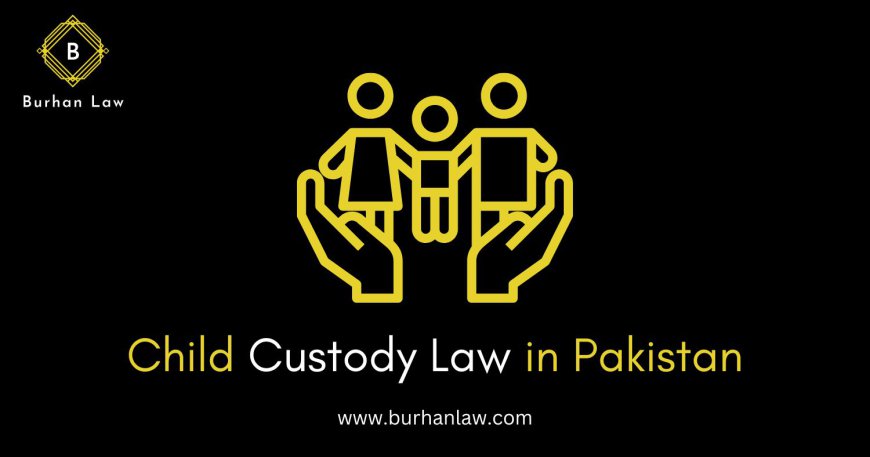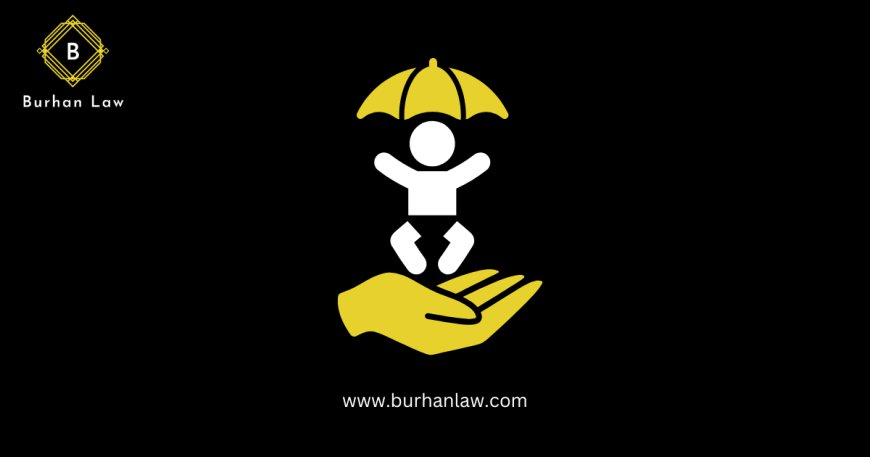Understanding Child Custody Law in Pakistan: A Simple Guide
Learn the basics of child custody law in Pakistan, your legal rights, and how decisions are made. Stay informed with our easy-to-follow guide.

Child custody law in Pakistan plays a vital role in ensuring that the best interests of the child are prioritized during custody disputes. Custody battles often arise due to divorce, separation, or other family issues, where determining who will take care of the child can become a complex legal issue.
Given the emotional and financial implications of such cases, it's essential to understand how the legal system in Pakistan governs child custody. This article will discuss the types of custody, the factors courts consider, and how to navigate the custody process, providing a comprehensive overview of child custody law in Pakistan.
Types of Child Custody in Pakistan
Child custody in Pakistan is typically divided into two types: legal custody and physical custody.
Legal Custody
Legal custody refers to a parent's authority to make significant decisions about the child's upbringing. These decisions often include education, healthcare, and religious teachings. In most cases, both parents may retain legal custody even if one parent is awarded physical custody. However, if the court finds one parent incapable of making sound decisions, it may grant sole legal custody to the other parent.
Physical Custody
Physical custody determines where the child will live. In Pakistan, physical custody is typically awarded to the mother, particularly when the child is young. The court often considers the age and gender of the child before deciding on physical custody. Fathers may be granted custody as the child grows older, particularly boys, depending on the court's determination of the child’s best interest.
Sole vs. Joint Custody
In some cases, one parent may be granted sole custody, meaning the child primarily lives with one parent while the other has visitation rights. Alternatively, joint custody allows both parents to share physical and legal responsibilities. Joint custody arrangements are less common in Pakistan, but some courts favor this when both parents are deemed capable caregivers.
ChilThe’s Best Interest: Factors Considered by Courts
In child custody disputes, the primary concern of the court is the best interest of the child. While the law doesn’t favor either parent outright, certain key factors influence the court's decision.
Parental Fitness
The fitness of each parent to care for the child is carefully evaluated. The court considers whether the parent can provide emotional, educational, and financial support. A parent's history of abuse, neglect, or irresponsible behavior can heavily influence the court’s ruling.
Child’s Preference
The child’s opinion may also be considered, particularly if they are older and mature enough to express their wishes. However, this is not the sole determining factor. The court still prioritizes the child's welfare over their preferences, especially in cases where one parent may attempt to manipulate the child.
Living Conditions
The parent’s ability to provide a stable and safe living environment is another crucial factor. The court may inspect each parent's home and assess whether the environment is conducive to the child’s well-being.
Child’s Gender and Age
The child’s gender and age may influence the court’s decision. For instance, young children, particularly girls, are often placed in the mother’s care, as it is presumed that the mother is better equipped to care for them during their formative years.

Legal Rights of Parents in Child Custody Cases
Father’s Rights
Although mothers are often awarded custody of young children, fathers have specific legal rights that allow them to petition for custody, particularly as the child gets older. Fathers can seek custody if they prove that they are more capable of providing for the child’s welfare. In some cases, fathers may also gain custody of sons when they reach a certain age, typically around seven years old.
Mother’s Rights
Under Islamic law, mothers generally have the right to custody of their young children, particularly daughters. The age until which the mother retains custody varies depending on the child’s gender and the family court’s discretion. However, suppose the mother is found to be unfit due to financial instability, remarriage, or any factor that could harm the child’s well-being. In that case, the court may transfer custody to the father or another guardian.
Extended Family’s Role
In cases where neither parent is deemed fit to provide adequate care, custody may be granted to a grandparent or other extended family members. This usually happens in situations where both parents are absent or incapable of taking responsibility for the child’s welfare.
Child Custody Process in Pakistani Courts
Filing for custody involves a well-defined legal process:
Filing for Custody
Either parent can file a petition for custody in the family court. The petitioner must provide evidence that supports their claim for custody, such as proof of financial stability, housing arrangements, and the ability to provide emotional support.
Court Hearings
Both parents present their cases during the court hearings, and the court examines all relevant evidence. This process may include witness testimony, psychological evaluations of the child (if required), and home visits.
Final Decision
The court’s final decision will be based on the best interests of the child. If the court believes that joint custody is viable and beneficial, it may allow both parents to share responsibilities. However, in most cases, one parent is given physical custody, and the other is granted visitation rights.
Visitation Rights in Child Custody Cases
Even if one parent is granted full custody, the other parent usually retains visitation rights. These rights ensure that the non-custodial parent can maintain a relationship with their child. However, if the court determines that visitation would not be in the child’s best interest, these rights may be restricted or denied.
Parental Alienation and its Impact on Custody Decisions
Parental alienation occurs when one parent tries to manipulate the child into rejecting the other parent. This behavior can severely harm the child’s emotional health and impact custody decisions. Courts take allegations of parental alienation seriously, as this may result in custody being awarded to the alienated parent to protect the child’s well-being.
Factors Courts Do Not Consider While Deciding Custody Claims
In some cases, courts in Pakistan may not take into account certain factors when deciding child custody claims. The paragraph titled “What Are the Factors That Court Does not Consider While Deciding The Custody Claims In Pakistan?” outlines these factors in detail. This is important for parents to understand, as they should focus on relevant issues during custody hearings.
Conclusion
Navigating the complexities of child custody law in Pakistan can be challenging, especially for parents unfamiliar with the legal process. Understanding the types of custody, the factors courts consider, and the rights of both parents can help ensure that the child’s best interests are always prioritized.
FAQs on Child Custody Law in Pakistan
How is custody decided for newborns?
Custody of newborns is usually awarded to the mother, as it is presumed that a young child’s primary needs are best met by the mother.
Can fathers request custody if the mother remarries?
Yes, if the mother remarries, the father can petition for custody, especially if the court believes the remarriage negatively impacts the child’s welfare.
What if both parents are unfit for custody?
If both parents are deemed unfit, custody may be granted to a close relative, such as a grandparent or an uncle, who can provide a stable environment.
Can a parent move abroad with the child after gaining custody?
Parents wishing to relocate abroad with the child after gaining custody must seek court approval, as the move could affect the child’s relationship with the other parent.
Does child support impact custody decisions?
Yes, the court considers whether the custodial parent can financially support the child. However, the non-custodial parent may be ordered to pay child support regardless of custody.
How does the child’s age affect custody?
Young children are often placed with the mother, while older boys may be placed with the father. Courts use the child’s age to determine the best living arrangement.
For More Information: Burhanlaw.com

 jamessatos
jamessatos